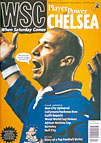 Kevin Bartholomew reflects on the plight of two clubs, and the greater significance of their demise
Kevin Bartholomew reflects on the plight of two clubs, and the greater significance of their demise
Brighton played Doncaster at Gillingham’s Priestfield Stadium on Valentine’s Day in a crucial relegation battle. But despite the fact that the outcome of the match would help determine which team would be banished to the the Vauxhall Conference (or worse), both sets of fans used the occasion to draw attention to their respective plights.
Under the banner ‘The Heart of Football’, the event was a sequel to last year’s already-legendary ‘Fans United’ day, when supporters came to Brighton from across Europe to protest against the Archer/Bellotti regime.This year, once again, there were a large number of neutrals in the 6,300 attendance (three times Brighton’s average ‘home’ gate). These included representatives of fans from all over the country and a contingent from the German Football Supporters’ Association.
Albion and Rovers fans originally came up with the idea for the day after recognising parallels between Doncaster’s situation and what had happened to Brighton last season. In Bill Archer and Ken Richardson, both clubs have suffered at the hands of absentee chairmen with dubious motives. Richardson’s sidekick Mark Weaver has been the subject of constant abuse and death threats, just like David Bellotti last season (although at least Brighton fans can content themselves with the fact that Bellotti never picked the team…).
Given the importance of the game, which turned out, predictably, to be an absolutely dire 0-0 draw, the solidarity displayed was remarkable. As an allusion to Richardson’s alleged arsonist tendencies (he faces a court appearance after being charged with conspiring to burn down Rovers’ ground), many of the fans in the largely unsegregated crowd donned firemens’ helmets, while records with a distinctively pyrotechnic theme were played over the tannoy.
But it was also clear that both sets of fans have their own agendas. Whereas Rovers’ rallying cry is ‘Richardson out!’, Brighton’s is ‘Bring Home the Albion’, a campaign to persuade Brighton council and local residents to let the club set up a temporary home at the town’s Withdean athletics stadium. Another priority for Brighton was to encourage more supporters to make the long trip to games at Gillingham, and hundreds of fans were ferried to the match in a fleet of ‘love buses’.
For Albion supporters, with the prospect of a return to Sussex, a new board in place and now a new manager in popular ex-club captain Brian Horton, there does at least seem to be a tiny glint of light at the end of the tunnel (providing, of course, they stay above Rovers until the end of the season). For Doncaster, the prospects are decidedly less bright. By the time Richardson appears in court (January 1999), the club may already have been reduced to ashes.
Although the original ‘Fans United’ proved a turning point for Brighton’s fortunes last season, it is doubtful whether its sequel will have the same effect on Rovers. But ‘Heart of Football’ day did demonstrate that supporters are capable of putting their allegiances to one side whatever the circumstances, and provided further evidence of the growing gulf between the ‘ordinary fan’ and those who run the game.
From WSC 134 April 1998. What was happening this month